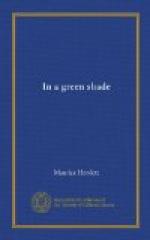But, of course, it won’t do. Miss Richardson does not, and cannot, tell us all. A novel is a piece of art which does not so much report life as transmute it. She takes up what she needs for her purpose, and that may not be our purpose. And so it is with poetry—we don’t go to that for the facts, but for the essence of fact. The poet who told us all about himself at some particular pass would write a bad poem, for it is his affair to transfigure rather than transmute, to move us by beauty at least as much as by truth. What we look for so wistfully in each other is the raw material of poetry. We can make the finished article for ourselves, given enough matter; and indeed the poetry which is imagined in contemplation is apt to be much finer than that which has passed through the claws of prosody and syntax. The fact, to be short with it, is that literature has an eye upon the consumer. Whether it is marketable or not, it is intended for the public. Now no man will undress in public with design. It may be a pity, but so it is. Undesignedly, I don’t say. It would be possible, I think, by analysis, to track the successive waves of mental process in In Memoriam. Again, The Angel in the House brought Patmore as near to self-explication as a poet can go. Shakespeare’s Sonnets offer a more doubtful field of experiment.
What then? Shall we go to the letter-writers—to Madame de Sevigne, to Gray, to Walpole and Cowper, Byron and Lamb? A letter-writer implies a letter-reader, and just that inadequacy of spoken communication will smother up our written words. Madame de Sevigne must placate her high-sniffing daughter, Gray must please himself; Walpole must at any cost be lively, Cowper must be urbane to Lady Hesketh or deprecate the judgment of the Reverend Mr. Newton. Byron was always before the looking-glass as he wrote; and as for Charles Lamb, do not suppose that he did anything but hide in his clouds of ink. Sir Sidney Colvin thinks that Keats revealed himself in his letters, but I cannot agree with him. Keats is one of the best letter-writers we have; he can be merry, fanciful, witty, thoughtful, even profound. He has a sardonic turn of language hardly to be equalled outside Shakespeare. “Were it in my device, I would reject a Petrarchal coronation—on account of my dying day, and because women have cancers?” Where will you match that but from Hamlet? But Keats knew himself. “It is a wretched thing to confess, but it is a very fact, that not one word I can utter can be taken for granted as an opinion growing out of my identical Nature.” So I find him in his letters, swayed rather by his fancies than his states of soul, until indeed that soul of his was wrung by agony of mind and disease of body. Revelation, then, like gouts of blood, did issue, but of that I do not now write. No man is sane at such a crisis.




